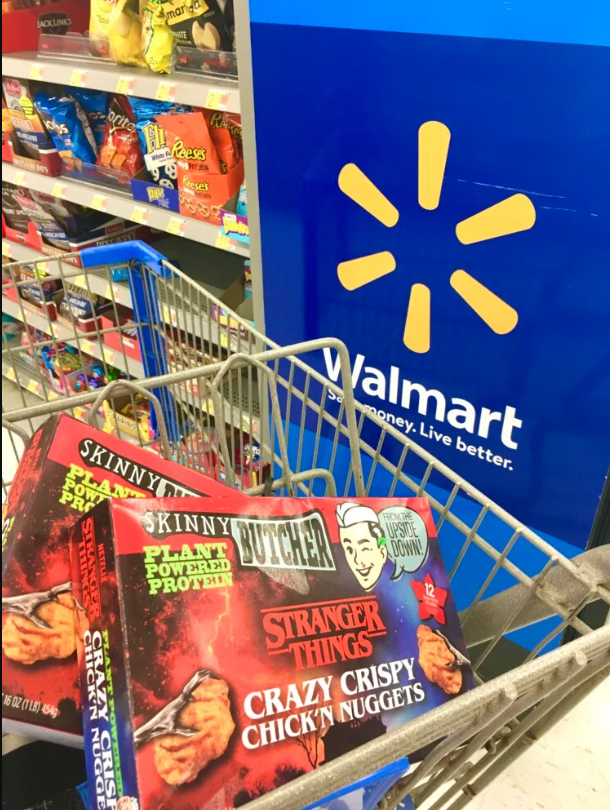Younger generations are more interested in vegan foods, and marketing professionals have taken notice.
On a recent Wednesday morning, I was at the Falmouth Walmart searching the frozen meat cases. The retro music, latest throw-back fashions and ancient shopping carts kicked up memories of childhood trips to Kmart and Zayre stores, circa 1986. Fitting, since my mission was to acquire Stranger Things chicken nuggets, only sold at Walmart. Ready for the plot twist? The Netflix show serves its nuggets all-vegan.
Made by the Michigan-based Skinny Butcher using wheat gluten and yellow peas and tied to this summer’s release of season 4 of the horror series set in the ’80s, the nuggets represent the new phenomenon of vegan meats co-branded with pop culture icons. The vegan chicken tenders are called Crazy Crispy Chick’n Nuggets and come in a box featuring a winking man with blood running out of his nose (a la main character Eleven) with the full-color nuggets grasped in black-and-white chickens’ claws. The boxes of vegan nuggets looked perfectly at home with other packaged meats in the Walmart end cap. There was no signage to indicate the nuggets were vegan, other than the words “Plant Powered Protein” stamped on the box.
At home, I served them alongside french fries, and my husband, who eats animal-based chicken, and my 9-year-old, who’s never eaten animals, both enjoyed them and asked me to buy the nuggets again. The nuggets reminded me of the flavor of KFC fried chicken, which I tried once in the early ’80s, and the texture of Burger King chicken sandwich patties, which I used to eat occasionally and sell regularly to customers in the late ’80s.
The earliest co-branded vegan meat I’ve found is Incogmeato’s Mickey Mouse-shaped chicken nuggets, which launched in 2020 and sell in major supermarkets. This season, the Lightlife vegan bacon and vegan hot dog lines co-branded with Buzz Lightyear from the classic kids’ movie “Toy Story.”
Incogmeato, which is part of the MorningStar brand, is owned by food industry heavyweight Kellogg, whose existence can be traced to Portland native Ellen G. White. These days Kellogg reminds web visitors it is “One of the Original Plant-Based Food Companies,” as it is in the process of breaking up into three separate companies, with one centered on plant-based meats and the other two focused on cereals and snack foods.
This new trend of co-branded plant-based meats reflects both the mainstreaming of vegan food and the growing number of non-food businesses that see benefits in aligning with plant-based meats. Sabina Vyas, senior director of impact strategies at the national Plant Based Foods Association, told me that co-branded vegan meats are part of a larger change afoot across the retail food market.
“Consumers have come to expect a variety of plant-based options on grocery shelves and in restaurants alike,” Vyas said. “Plant-based brands are also collaborating with high-profile celebrities, partnering with major airlines, and more.”
Vyas said the co-branded vegan meats give entertainment companies an opportunity “to demonstrate their commitment to offering foods that are beneficial to personal and planetary health.”
One survey after another shows today’s young people are more concerned about health and the environment than older generations. No surprise, therefore, that vegan foods associated with childhood, such as hot dogs and chicken nuggets, would be the first to partner with youth-oriented TV shows and movies, keen to support issues important to young people.
Vegan eats are particularly popular with members of Gen Z (born roughly between 1997 and 2012). The youngest Gen Zers will enter fourth and fifth grade this fall, and the generation is already proving more interested in plant-based foods than millennials, many of whom are their parents.
According to research conducted before the pandemic by college food vendor Aramark, 79 percent of Gen Z avoids animal-based meat up to twice a week and 65 percent wants to eat more plant-based meals. After research from plant-based meat brand Impossible Foods found millennials with children eat more plant-based meat than child-free millennials, multiple news reports explored how “millennials are raising an army of vegan kids.” The research also found that members of Gen Z are the least likely of all generations to agree with the statement: “Meat is part of the American identity.”
However, it doesn’t end with Gen Z. Another generation is coming along behind it, which marketers are calling Generation Alpha. The oldest members of this emerging generation are only 9 years old and are beyond the reach of marketing surveys. Yet knowing quite a few members of Gen Alpha, I predict these young people will look at Gen Z’s love of vegan meals and say, “Hold my soy milk,” before showing us how veg-forward a generation can get. Meanwhile, “Stranger Things” nuggets demonstrate that the creative team who gave us “the upside down” has a solid grasp on the reality of marketing to young people in the 21st century.
Article Credits: Central Maine

Pingback: 70% of US Population is Now Consuming Plant-Based Foods, According to New PBFA Report - SLSV - A global media & CSR consultancy network